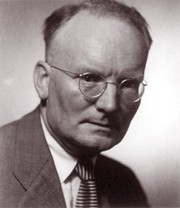
“The prize was awarded for his research on leptospirosis, which not only proved to be of great scientific importance, becoming generally accepted in scientific circles, but also of great practical significance and benefit to human life.”
Mit Leptospirosen ist diejenige Gruppe von akuten Infektionskrankheiten gemeint, deren Erreger die Bakterienfamilie der Leptospiren sind. In seiner zusammenfassenden Darstellung orientierte G. für jede einzelne Leptospirose über den tierischen Träger des Erregers (Vorkommen, Lebensweise, Ausscheidungen) sowie über Epidemiologie, Ätiologie und Klinik der menschlichen Krankheit. Darin eingearbeitet waren zahlreiche eigene Forschungsresultate, so etwa G.s Beiträge zur Identifizierung der Schweinehüterkrankheit als Leptospirose und nicht als Viruserkrankung (Erreger L. pomona im Urin infizierter Schweine) oder der Nachweis, dass die sogenannte Erbsenpflückerkrankheit vom gleichen Erreger wie das Feldfieber verursacht werde (L. grippothyphosa, übertragen durch das Urin der Feldmäuse).

